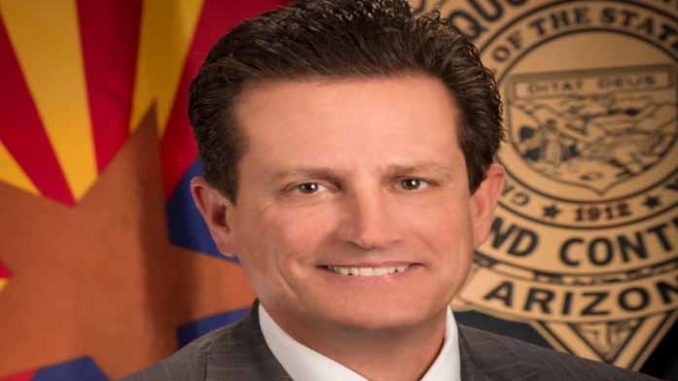
Numerous headlines resulted after Dr. Cara Christ, the state’s top public health official, conceded under oath on Oct. 8 that she does not have any definite criteria or benchmarks for recommending Gov. Doug Ducey relax his current COVID-19 executive orders.
But lost in the clamor after Christ’s testimony were comments made under oath in the same hearing by John Cocca, director of the Arizona Department of Liquor Licenses and Control (DLLC). Cocca was appointed by Ducey as DLLC’s director in 2015 after a long career with the Scottsdale Police Department.
Ducey, Christ, and Cocca are defendants in a lawsuit filed in August by more than 100 bars and saloons across the state who hold Series 6 and Series 7 liquor licenses. The licensees contend they have been financially harmed -some say irreparably- by the governor’s various executive orders issued in response to the COVID-19 pandemic.
Ilan Wurman is the attorney representing the licensees who are seeking a court order from Maricopa County Superior Court Judge Pamela Gates requiring state officials to treat all liquor license holders the same, something Cocca conceded during his Oct. 8 testimony has not happened since March.
A Series 6 license permits the retail sale of beer, wine, and spirituous liquors (i.e. rum and whiskey) to be consumed on-site or sold in unopened containers for consumption off the premises. A Series 7 is a “beer and wine” license, also with off-sale privileges. The establishments can offer food service or not.
In March, Ducey issued Executive Order 2020-09 which closed all “bars” effective March 20. At the same time, he allowed Series 12 licensees, which are restaurants, to sell liquor for off-site consumption even though state law prohibits such sales.
Ducey also ordered the DLLC and law enforcement officials across the state to do nothing about the Series 12 violations.
On the stand, Cocca acknowledged that Series 3 (microbreweries), 11 (hotel bars), 12 (restaurants), and 14 (private clubs) often “act like” Series 6 & 7 bars. He also testified that Ducey’s executive orders require DLLC to treat some Series 6 licensees differently, such as a golf club compared to a mom-and-pop saloon without a kitchen.
It is DLLC’s mission, according to Cocca, to “protect public safety and support economic growth through the responsible sale and consumption of liquor, and to efficiently license qualified applicants.” But the director admitted not all establishments which sell liquor have been required to pause operations or attest under penalty of perjury to comply with public health mandates.
Most bars with kitchen service were allowed to briefly reopen in May for “dine-in” services, but on June 29 Ducey issued EO 2020-43 which ordered Series 6 & 7 licensees “whose primary business is the sale or dispensing of alcoholic beverages” to pause operations until July 27. Off-sale business was still allowed.
Meanwhile, Series 12 restaurants have been allowed to engage in on-site and off-sale business since May 11. Wurman argues EO 2020-43 violates the Arizona Constitution, which requires the government to treat similarly situated citizens similarly.
One thing which stood out during Cocca and Christ’s Oct. 8 testimony was that Ducey and his public health officials based their uneven policies toward license-holders on assumptions that bars posed a “higher risk” of community spread of COVID-19 than restaurants, even though both sell alcohol. But the state didn’t provide scientific evidence to support those assumptions.
“Even the CDC maintains the bars can mitigate in much the same way restaurants can—by cleaning and disinfection, by improving ventilation, by modifying layouts and seating, and by providing physical guides,” says Wurman, who argues his clients “face irreparable injury” unless they are allowed to reopen as soon as possible with as few restrictions as necessary, just like their competitors.
Judge Gates denied a request in September for a temporary emergency injunction which would have allowed Wurman’s clients to reopen provided they comply with public health mandates. But at the time the judge took issue with Ducey’s assertion that state law gives him authority to order DLLC and police agencies to disregard off-sale violations by restaurants.
“The court finds the executive order banning enforcement of a Series 12 licensee violation of off-premises sales of spirituous liquors impermissibly stretches the governor power he is granted under state laws,” the judge ruled.
Prior to Gates’ ruling last month, Wurman’s case was bolstered by Arizona Attorney General Mark Brnovich, who briefed the judge on the issue of Ducey’s statutory authority. The brief argued Ducey “cannot take actions that are inconsistent with other statutes or the Constitution when exercising” the emergency powers statute.
In addition, the attorney general noted the Arizona Constitution “does not provide the Governor any authority during a health emergency to arbitrarily discriminate between similarly situated businesses for months.”
Then last week, Brnovich’s office filed a supplemental brief after Cocca and Christ testified. The supplement reiterates the attorney general’s position that Arizona law “does not authorize the continued disparate treatment of bars and restaurants, as contained in (EO 2020-43), seven months into this emergency.”
Ducey has retained private attorneys at taxpayer expense to defend his executive orders. In court, those attorneys contend Ducey is permitted to allow Series 12 licensees to violate state law, arguing such conduct “qualifies as a recovery and response activity” for the restaurant industry.
Gates is expected to rule later this month on Wurman’s motion for a permanent injunction against Ducey’s executive orders related to his clients But even if the judge sides with the bar owners, Wurman said it could be too little too late for some who have gone months without steady revenue.
That’s because victory does not come with monetary damages as the case stands at this time. Last month Wurman filed a $12.5 million notice of claim against Ducey seeking compensation for his clients based on Ducey’s order granting off-sale privileges to Series 12 licensees. There is a 60-day waiting period before the current lawsuit can be amended to include the monetary damages claim.
